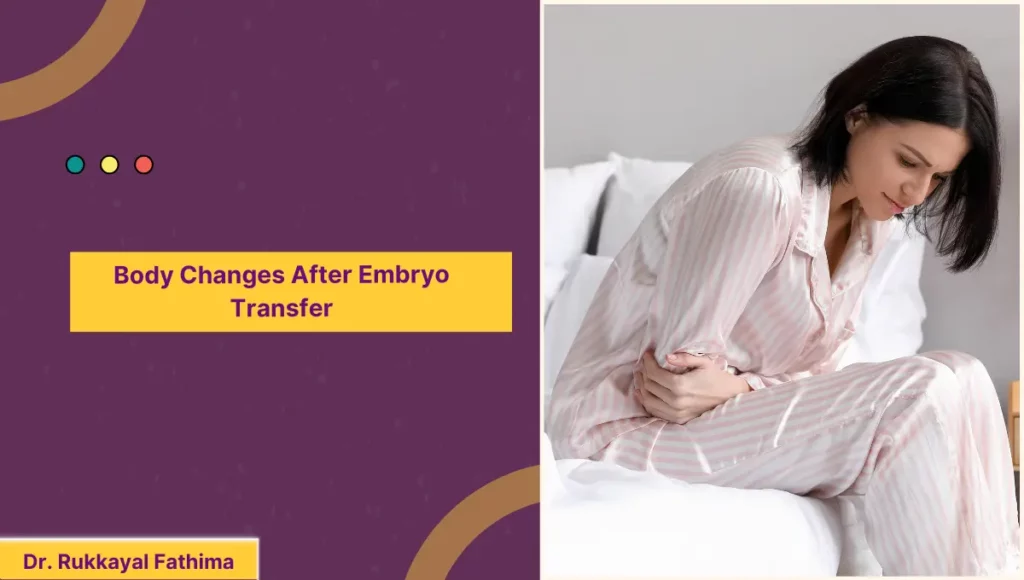Have you recently undergone an embryo transfer an worried about the changes your body is undergoing? Then this article is for you.
IVF (In vitro fertilization) is a complicated procedure that involves undergoing five steps:
- Ovulation induction,
- Egg & sperm retrieval,
- Fertilization,
- Embryo culture, and
- Embryo transfer.
The fifth step, embryo transfer, is the most important step of the IVF procedure. This step determines whether your IVF cycle was a success or not.
It is normal for you to be worried and anxious about the body changes you experience after this procedure. This article discusses each body change and what they signify about your pregnancy. Read it and use it for your reference.
The Days Following Embryo Transfer
The days following the embryo transfer are the most crucial period of your IVF cycle. You need to be very careful and conscious of what you can and cannot do to ensure a successful pregnancy.
Your body will also start to experience some physical changes during this time. Below are some common changes you will undergo after an embryo transfer.
Spotting and Bleeding
You will experience some spotting or bleeding after about one week after embryo transfer. This bleeding is most likely due to a successful implantation of the embryo into the uterine lining.
The embryo will burrow deep into your uterus during implantation. This can cause slight bleeding and pelvic pain. You don’t need to worry if the bleeding is a sign of menstruation.
Breast Tenderness
Your body will undergo high levels of hormonal fluctuations during this period. This can cause your breasts to become sore and tender. If implantation is a success, your breasts will also need to undergo changes to start secreting milk.
Increased Urination
Your embryo needs adequate blood flow to grow properly and healthily. Thus, you will have an increase in the blood flow to your pelvic regions. This, and the hormonal changes, will increase your urge to urinate.
Gastrointestinal Changes
Nausea, vomiting, and bloating are some common symptoms of pregnancy. You will start experiencing these symptoms about one or two weeks after embryo transfer.
You don’t need to worry about these symptoms; they will reduce as months pass by. However, if these symptoms are intense and painful, you should consult your IVF doctor.
Navigating Your Emotions
Your emotional state will be more fragile during this period. The stress of the IVF procedures and the hormonal fluctuations in your body can make you emotionally vulnerable.
It is essential to take care of your emotions during this period, as they can influence your hormones and impact your implantation rate.
Understanding the Two-Week Wait
The two weeks after embryo transfer can be the most anxious period of your IVF journey. You need to stay calm and follow all the instructions your doctor suggests to ensure a successful pregnancy.
Managing Symptoms
The symptoms we discussed above are some symptoms you might get after embryo transfer. You might even get other symptoms we haven’t discussed. Don’t worry, and learn why you get those symptoms. Most symptoms are temporary and disappear within a few days.
Knowing When to Reach Out to Your Doctor
In case those symptoms do not decrease or get intense and painful over time, immediately consult your IVF doctor. Understand what happened and take the necessary measures. It is good if those symptoms weren’t anything serious, but if they signified any underlying conditions, take the necessary actions.
Conclusion
It is normal for your body to undergo some changes during and after the IVF treatments. Understanding these changes can help you navigate this phase smoothly without worry. It is best to be aware of what to do and not do, Actions like stressing or bending your body during this period is not advisable.
Discuss with your doctor and learn why you should expect and what you need to do during this period. Maintain a good health and a positive mindset. These can improve your chances of success.
No, there is no major time difference between the implantation of frozen or fresh embryos. Frozen embryos will be thawed and brought to normal stage before being transferred. So both of them will implant at the same time.
After embryo transfer, the embryo will take around one or two days to implant in the uterus. They will completely implant within 7–10 days, and the body will start producing the pregnancy hormones (hCG) around the second week of embryo transfer.
The number of days it might take to get your period after a failed IVF differs for each person based on their body condition and hormone levels. On average, you might get your period about 4–6 weeks after a failed IVF. Some might even get their period after two weeks.
It may take some time (probably months) for your body to go back to normal after an IVF cycle. But, yes, your body does gradually recover and go back to normal after IVF. The time taken to recover may vary for each woman based on their body and health condition.





